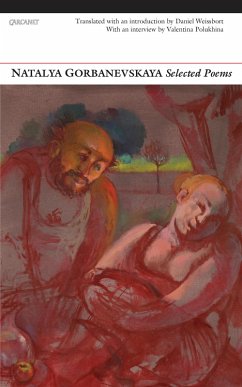In this new, enlarged selection of translations he returns to a poet who has continued, in exile, to engage with the cause of human freedom and the poetic traditions of her homeland. Anna Akhmatova regarded Gorbanevskaya as one of the small group of poets who kept Russian poetry alive. Weissbort, one of the leading translators of Russian poetry in Britain, expands our understanding of the continuing vitality of her work. An interview with Valentina Polukhina in which Gorbanevskaya discusses her life and beliefs provides illuminating context.
Dieser Download kann aus rechtlichen Gründen nur mit Rechnungsadresse in A, B, BG, CY, CZ, D, DK, EW, E, FIN, F, GR, H, IRL, I, LT, L, LR, M, NL, PL, P, R, S, SLO, SK ausgeliefert werden.









